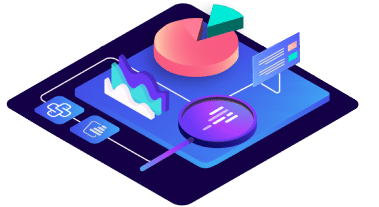
The certified online training as Data Scientist - Focus Python enables you to derive, verify and interpret predictive models from data in order to communicate the model results efficiently.
The additional skill building in Machine Learning will qualify you for the job role of Data Scientist or another analytical job role such as the Business Intelligence Analyst or Financial Analyst upon successful completion of the career path.
Objective:
Refresh knowledge of Python and mathematical principles
Description:
Participants carry out analysis and data manipulation in Python using the pandas and Matplotlib packages
Chapter 1: Data Analytics with Python
Participants get to know our interactive programming environment - the Data Lab - and brush up on key programming and Python basics for data processing with Pandas, data visualization with Matplotlib and Seaborn, and database querying with SQL Alchemy.
Chapter 2: Linear Algebra
Participants become familiar with the mathematical background of data science algorithms and learn the basic concepts of linear algebra. Participants use the NumPy package to perform calculations with vectors and matrices.
Chapter 3: Probability Distributions
Participants learn more about the statistical background of data science algorithms. They explore important statistical concepts and learn about discrete and continuous distributions.
Objective:
Solving supervised and unsupervised machine learning problems with sklearn
Description:
Participants create data science workflows with sklearn, evaluate their model performance using appropriate metrics, and learn about the overfitting problem
Chapter 1: Supervised Learning (Regression)
Participants learn how to use the Python package sklearn with linear regressions. They also learn about the regression model’s assumptions and evaluating the predictions generated. Participants learn about the bias-variance trade-off, regularization, and various metrics of model quality.
Chapter 2: Supervised Learning (Classification)
Participants are introduced to classification algorithms using the k-Nearest-Neighbors algorithm and learn to evaluate the algorithm and assess classification performance. They optimize the parameters of their model and pay attention to dividing the data into training and evaluation sets.
Chapter 3: Unsupervised Learning (Clustering)
Participants learn about the k-Means algorithm as an example of an unsupervised learning algorithm. They critically examine the algorithm’s assumptions and performance metrics. Then they take a brief look at an alternative to k-Means clustering.
Module 1 Module 2 Machine Learning Basics
Chapter 4: Unsupervised Learning (Dimensionality Reduction)
Participants learn how to reduce the dimension of their data using Principal Component Analysis (PCA) and use PCA to generate uncorrelated features from the original data. In this context, they explore the topic of feature engineering in more detail and new features are generated from the old ones.
Chapter 5: Outlier Detection
Participants learn about different approaches to identifying outliers and understand how to deal with these unusual data points. They use robust measures and models to minimize the impact of outliers.
Objective:
Expanding the data science toolkit
Description:
Participants deepen their knowledge of data classification models. In doing so, they also expand their skills in collecting and preparing data
Chapter 1: Data Gathering
Participants learn to gather data by mining web pages and PDF documents. They structure collected text data using regular expressions so that they can use it together with familiar algorithms.
Chapter 2: Logistic Regression
Participants learn a second classification algorithm: logistic regression. They use new performance metrics to evaluate results and learn how to prepare non-numeric data for their models.
Chapter 3: Decision Trees and Random Forests
Participants learn about the decision tree as an easy-to-interpret model. They combine multiple models in an ensemble to improve the predictions of their model. They also learn methods to deal with unbalanced categories.
Chapter 4: Support Vector Machines
Participants learn about a final classification algorithm - Support Vector Machines (SVMs) and examine the behavior of different kernels for SVMs. They also learn the typical steps of Natural Language Processing (NLP) and work through an NLP scenario using bag-of-words models.
Chapter 5: Neural Networks
Participants are introduced to artificial neural networks and learn more about deep learning, to create a multilayer artificial neural network and apply it to a data set.
Objective:
Independent application of simple and complex modeling
Description:
Participants gain confidence in solving data science problems and learn to communicate results competently
Chapter 1: Visualization and Model Interpretation
Participants learn important methods for interpreting and visualizing machine learning models. By using modelagnostic methods for interpretation, they learn to derive and communicate insights into the functioning of their models.
Chapter 2: Spark
Participants learn why working with distributed storage systems is relevant. Using the Python package PySpark, they learn how to read distributed databases, perform big data analyses and use known machine learning algorithms on distributed systems.
Module 3 Advanced Topics in Data Science
Chapter 3: Exercise Project
Participants work on a prediction problem using a larger data set and independently apply their data science skills from cleaning the data set to interpreting the model. Participants receive feedback on their approach to solving the problem in a project consultation with StackFuel‘s mentoring team.
Chapter 4: Final Project
Participants are given another larger dataset to analyze independently and solve with less assistance than they received for the practice project. Participants receive feedback on their solution approach in an individual project consultation with the StackFuel mentoring team.
The demand for data experts is high. Around 4 million data experts will be needed in Europe by 2025. In Germany alone, 149,000 IT jobs are currently vacant. The demand for data and AI experts in particular continues to grow enormously.
But a decision for a data career is so much more than just a safe decision for the future! As a data expert, you deal with powerful, socially relevant topics, are a tech professional, and are communicative and creative at the same time. The profession is varied, can be combined with most other professions and offers an attractive salary. And most importantly, with us it can be learned unerringly!
Yes, after successful completion of the training, you will receive a certificate of completion from us that you can show in your job applications. Data Analysts and Data Scientists are desperately sought after in many business sectors. Even without relevant work experience, your chances of finding an entry-level job are good. In addition, there are analysts in almost every industry who have different job titles, but the skills you need are the same as those of a data analyst or data scientist.
Yes, our online training courses are designed to offer you the greatest possible flexibility. In general, we recommend that you plan six to eight hours per week for learning. When you want to schedule this time is up to you and is not prescribed by us. In our career paths, the Data Analyst and Data Scientist course, we offer live webinars where you can ask our mentors questions, but you don't have to attend if it doesn't fit into your schedule.
(Participants in our sponsored training courses are excluded. These must attend a fixed number of hours per week and are obliged to participate in the live webinars).





StackFuel GmbH
Nostitzstrasse 20
10961 Berlin
info@stackfuel.com
030 / 544 533 420
We need your consent before you can continue to visit our website. We use cookies and other technologies on our website. Some of them are essential, while others help us improve this website and your experience. For more information about how we use your data, please see our Privacy policy.
We use cookies and other technologies on our website. Some of them are essential, while others help us improve this website and your experience. For more information about how we use your data, please see our Privacy policy. Here you can find an overview of all cookies used. You can give your consent for entire categories or view more information and select specific cookies.